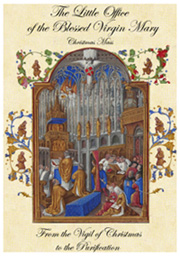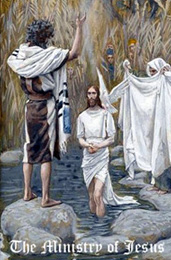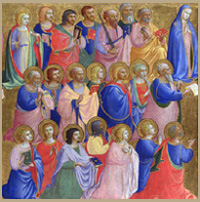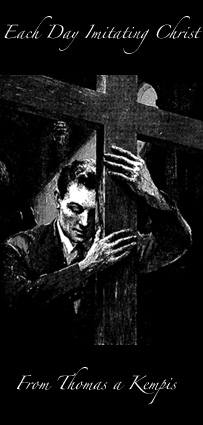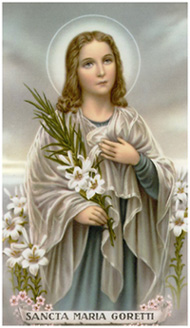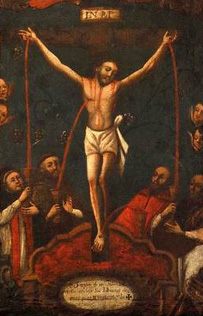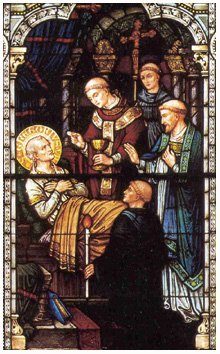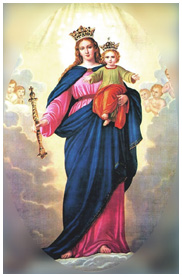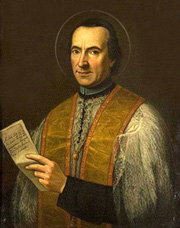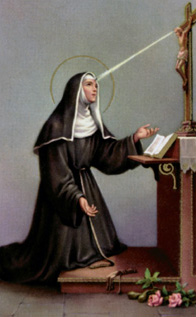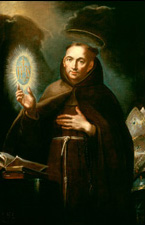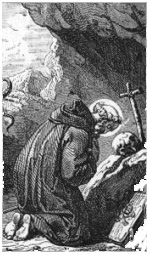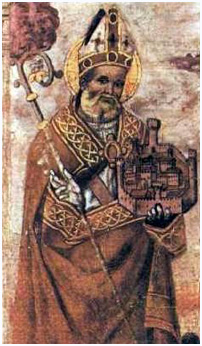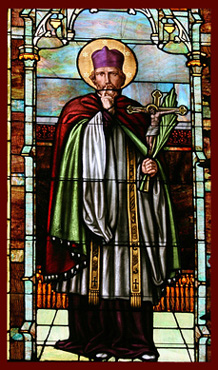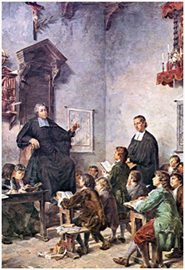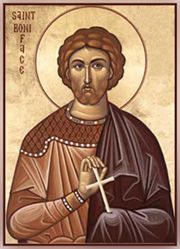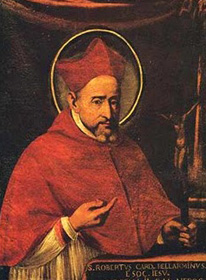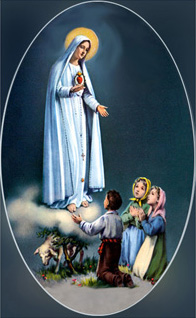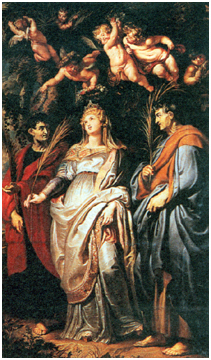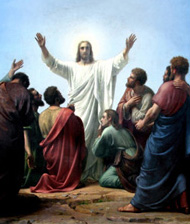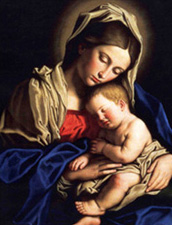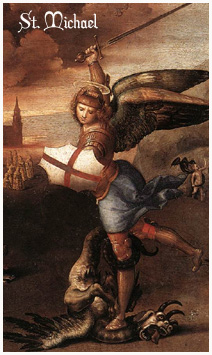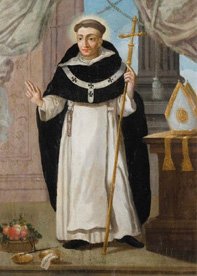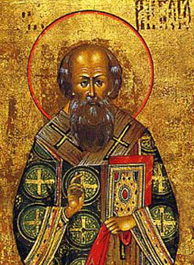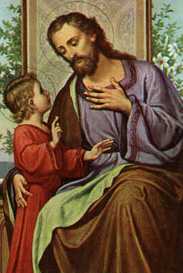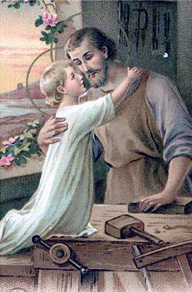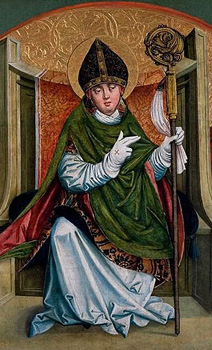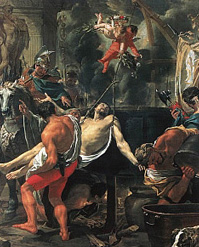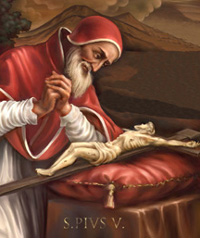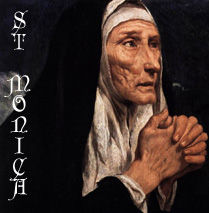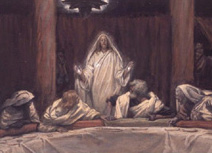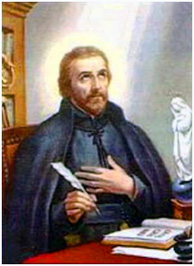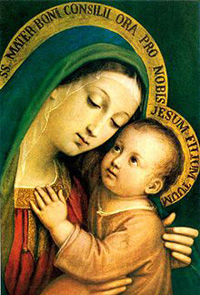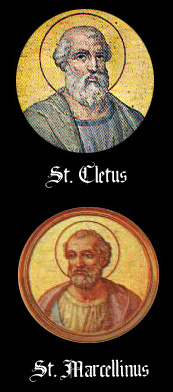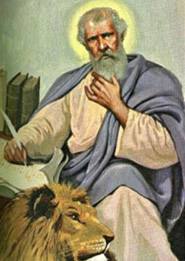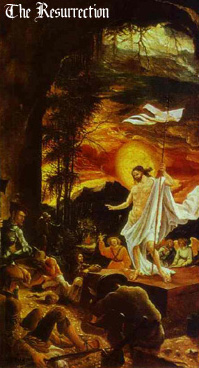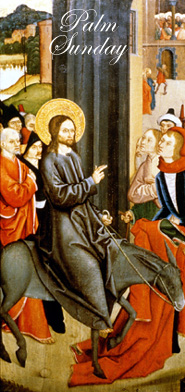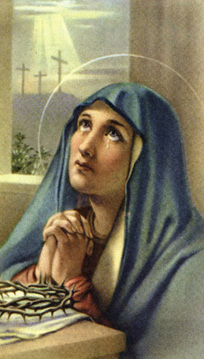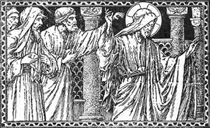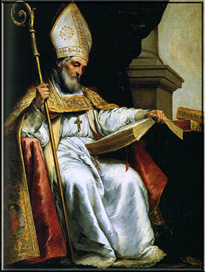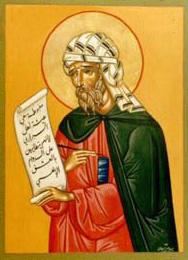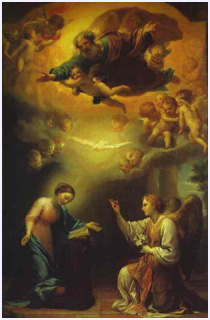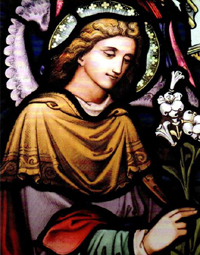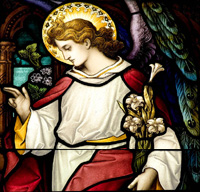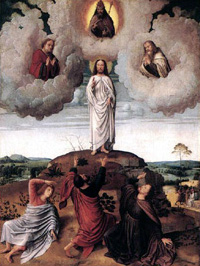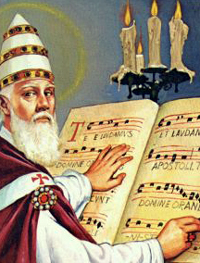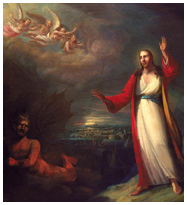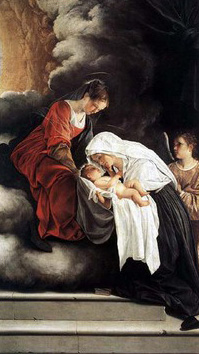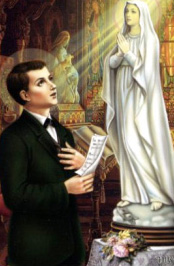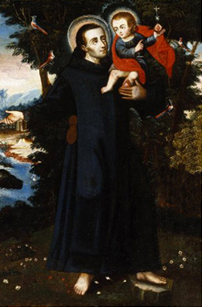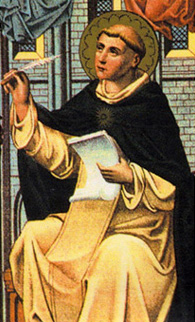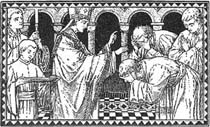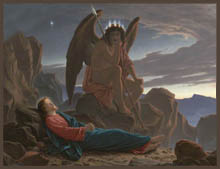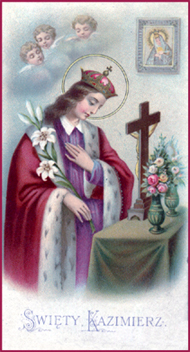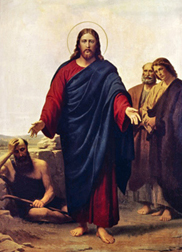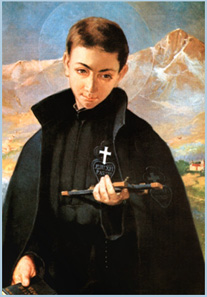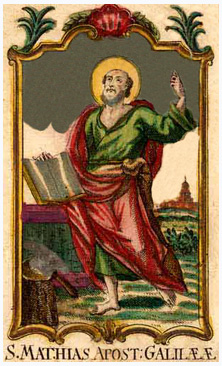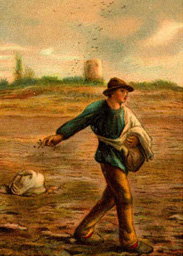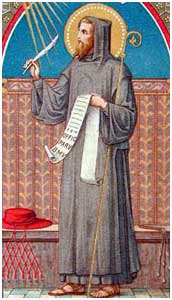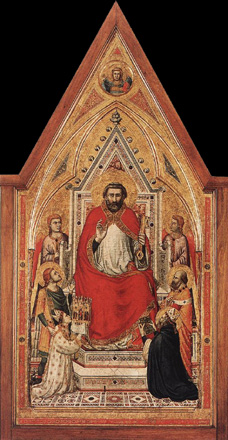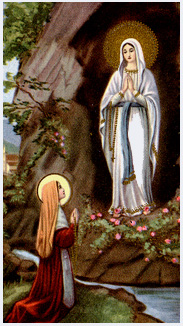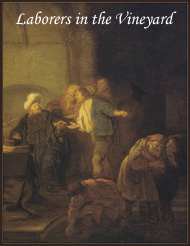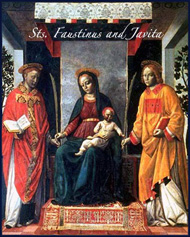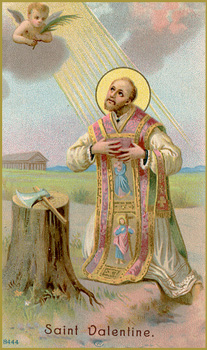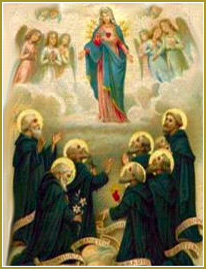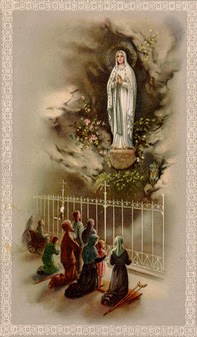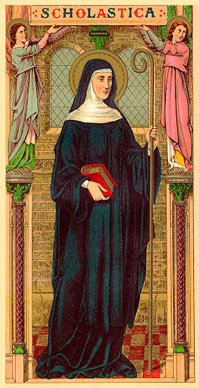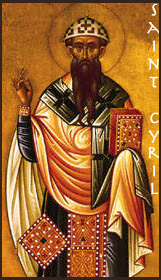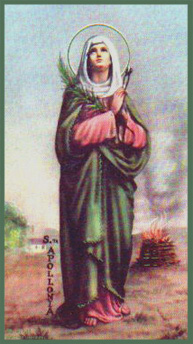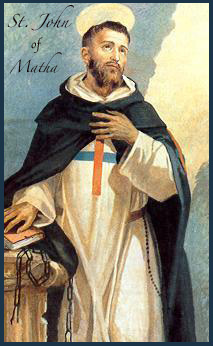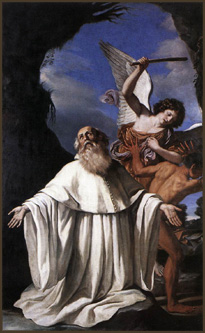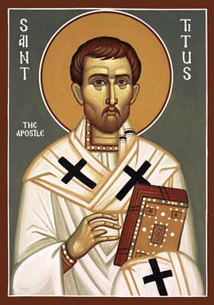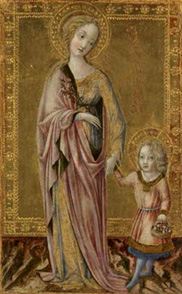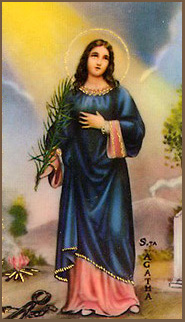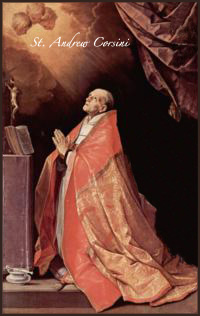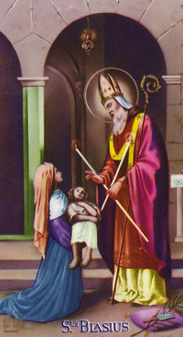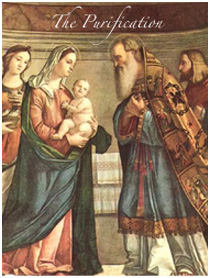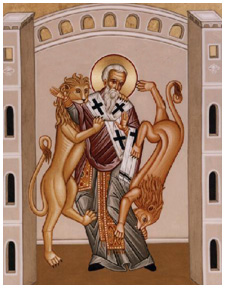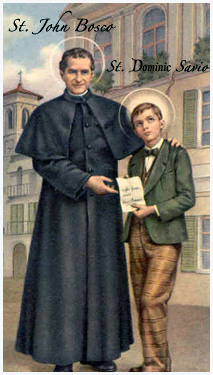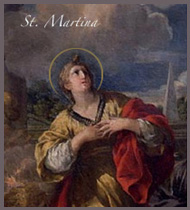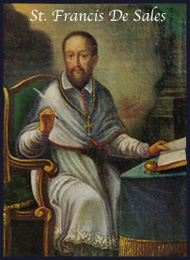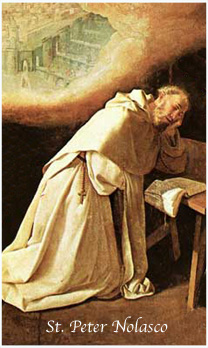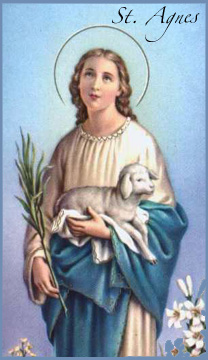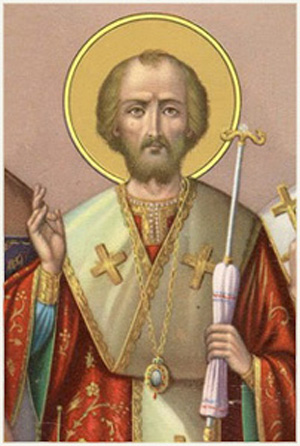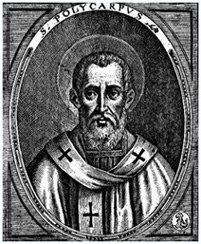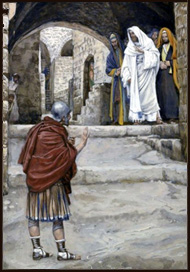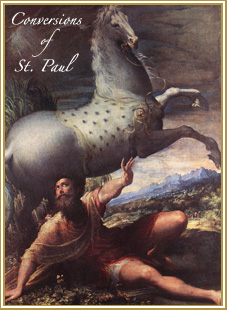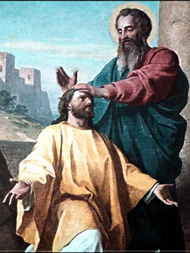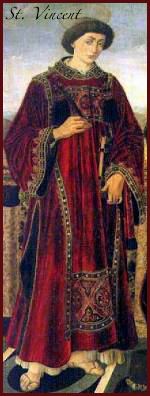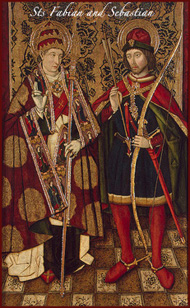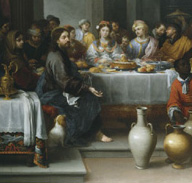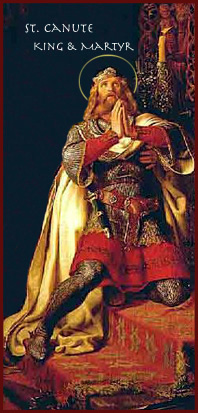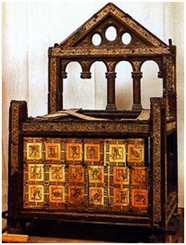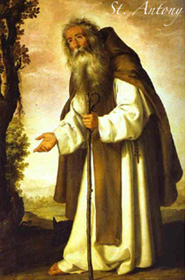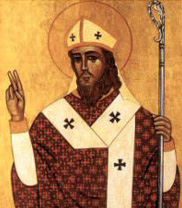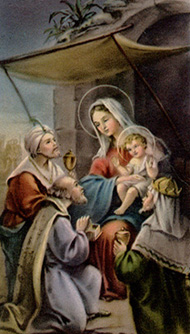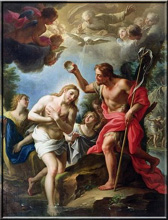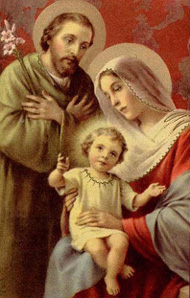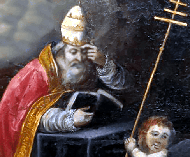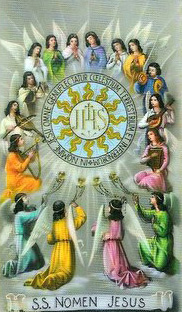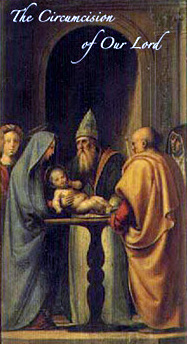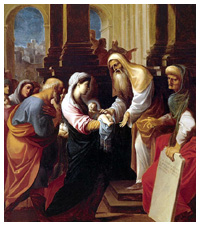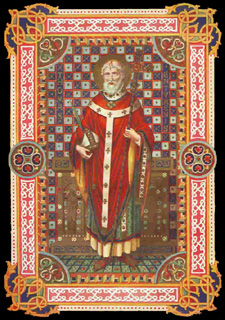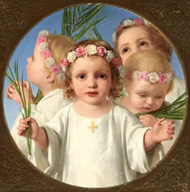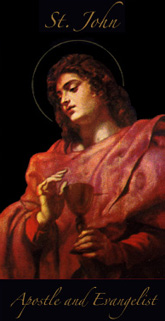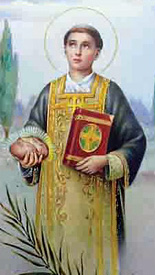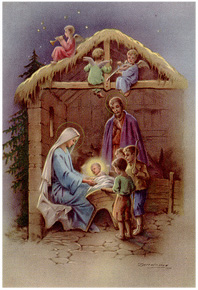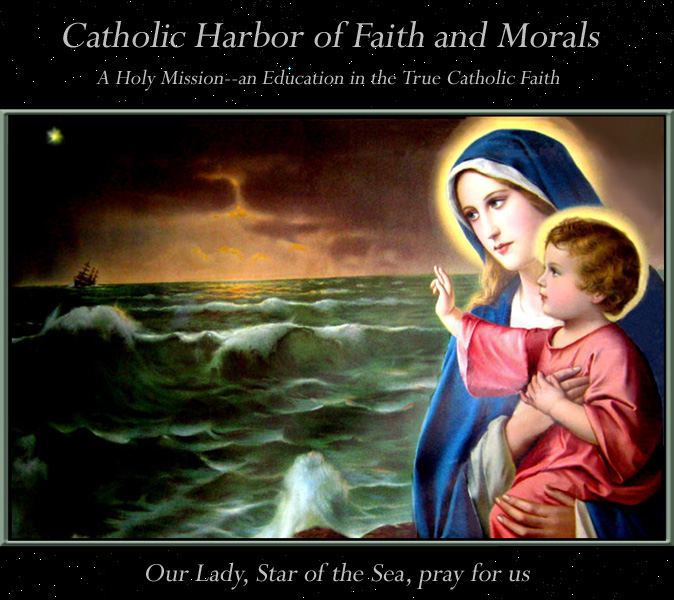
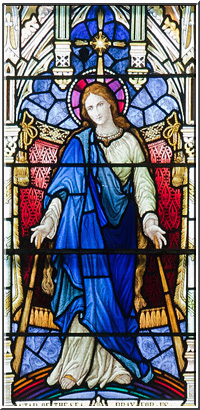
A Prayer to Mary, Queen of Heaven and our Advocate
"Mary is that woman by whom hell is overcome, the devil trodden upon, man saved."--St. Anselm.
| Hail, Queen of Heaven, the ocean star, Guide of the wand'rer here below! Thrown on life's surge we claim thy care, Save us from peril and from woe. Mother of Christ, Star of the Sea, Pray for the wanderer, pray for me. |
Sojourners in this vale of tears, To thee, blest advocate, we cry; Pity our sorrows, calm our fears, And soothe with hope our misery. Refuge in grief, Star of the Sea, Pray for the mourner, pray for me. |
| O gentle, chaste, and spotless Maid, We sinners make our prayers through thee; Remind thy Son that He has paid The price of our iniquity. Virgin most pure, Star of the Sea, Pray for the sinner, pray for me. |
And while to Him who reigns above, In Godhead One, in Persons Three, The source of life, of grace, of love, Homage we pay on bended knee; Do thou, bright Queen, Star of the Sea, Pray for thy children, pray for me. |
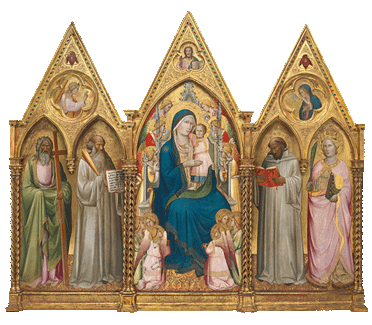
Prayers, Devotions, Feasts and Books Dedicated to Our Blessed Mother


And Jesus, hearing this, marvelled; and said to them that followed Him: Amen I say to you, I have not found so great faith in Israel.--Matt. Viii. 10.
This admirable faith of the Roman centurion, so highly praised by our Lord Himself, has been considered throughout the centuries as a model for all true believers.
Faith is a supernatural, theological virtue by which, relying on the authority of God, we firmly believe whatever God has revealed and the Church proposes for our belief. Faith is called a virtue because it is a habit inclining us to good; it is supernatural, because it is not Aquired by our own efforts, but is infused into our souls by God Himself; it is termed theological, because it has God for its immediate object; its motive is the authority of God, because only God, who can neither deceive nor be deceived, is the author of the truths of faith. God delivers His word to us, not directly, but through His infallible Church (Matt. xxviii. 19; Rom. x. 17). Scripture and tradition, without an authoritative interpreter, are not reliable guides in matters of faith, as is proved by the numerous mutually contradicting Protestant sects. Faith differs, from opinion, which is doubtful assent; from knowledge, which rests on experience or reason; from human belief, which depends on the authority of men. The object of faith is not some, but all of the truths that God has revealed and proposes to us through the Church. The Church proposes the teachings of revelation to us mainly in the Apostles' Creed, and in the definitions of the Popes and Councils. The Apostles' Creed contains the fundamental truths which we are to believe. It is necessary to believe all the truths the Church teaches, but it is not necessary to know them all explicitly. The truths absolutely necessary to be known by all are: that there is a God; that there is a future life of reward and punishment (Heb. xi. 6 ff.). Since the preaching of the Gospel, it is also required to know and believe the mysteries of the Trinity and of the Incarnation and Redemption (John xiv. 6; xvii. 33). Anyone ignorant of these essential truths cannot be absolved in confession. Parents should instruct their children in these important doctrines from their earliest years. Truths that all are bound to know, as far as they are able are: the Articles of the Creed; the Commandments; the Sacraments, at least those that a given person needs to receive; the Lord's Prayer, the acts of the various virtues, such as, the acts of faith, hope, charity, contrition.
Faith must be firm, i.e., it must exclude all doubt, hesitation, or disbelief. It must be blind, i.e., we must not seek any other reason than the authority of God for what we are asked to believe (John xx. 29). The reason for this latter quality is that faith, being concerned with supernatural truths, is above the natural grasp of our finite minds. The fact that we cannot understand the truths of faith is no reason for rejecting them; because they have God for their author; because the natural world is filled with mysteries which we accept but cannot understand; because constantly we blindly trust the authority of scientists, historians, doctors, lawyers, etc. Faith is reasonable, i.,e., we can establish on rational grounds all the foundations of faith, namely, the existence, knowledge, and truthfulness of God, the divinity of Christ and of the mission of the Church. Faith should be entire, i.e., it must extend to every dogma without exception.
Faith is necessary for salvation (Heb. xi. 6), for it is the root and foundation of our justification. Without faith it is impossible to perform works that are meritorious of life eternal, although one may do many things that are naturally good. Faith imposes a two-fold obligation: a negative obligation, which always binds, of never sinning against it; a positive obligation of making acts of faith before God and of professing our faith before men. Sins against faith are: infidelity, i.e., the total rejection of the Christian religion by those who remain outside the true faith, although they know it sufficiently well to embrace it; apostasy, i.e., the rejection of the Christian religion for a false one; heresy, i.e., the obstinate denial of an Article of faith by a baptized person; deliberate doubt concerning a matter of faith; exposing one's self to the danger of losing the faith by keeping bad company, reading injurious literature, etc. We are obliged to make acts of faith from time to time, especially when in danger of losing our faith. It is never permissible to deny the faith before men, even in appearance (2 Mach. vi. 21 ff.), or by silence; on the contrary, a person is bound to profess his faith publicly whenever God's glory or our neighbor's good requires it (Matt. v. 16).
The knowledge derived from faith is infinitely superior to that which comes from human wisdom, and is at the same time far easier and more secure. How highly then should we appreciate the gift of faith! We should carefully avoid all things by which faith is lost, such as, wilful doubt or denial of Articles of faith; or imperiled, such as, neglect of religious duties, bad books or company, mixed marriages, Godless education, joining secrete societies (ex.Freemasons), etc. We should pray for a great and living faith.


This point, my brethren, needs much attention from some of you. The earthen vessel in which we have so divine a treasure as faith, is, you must admit, perilous enough in its unstable fragility, without being sordidly neglected, without being corroded and buffeted by filth and iniquity. Now, you easily grant that you fail in other matters, but not, you think, in faith. You do not see that contradicting your religion in practice is endangering your belief of it. I know, my brethren, and am glad to proclaim that poor sinners can fall very low and yet never doubt about Catholicity. In that, too, is their one hope of salvation; for faith keeps open their access to the Church, and access to her is access to God's mercy. They begin to look hopeless only when, by word or act, they cast themselves into the morass of soul-destroying heresy. It is of apostates St. Paul uses the fearful words about the impossibility of being renewed again to penance. But notice that on this very question of preserving or losing faith, the same Apostle has a word of warning for those who fail not in belief but in conscience. When he writes: "Having faith and a good conscience, which some rejecting have made shipwreck concerning the faith" (i Tim. i. 19), he sufficiently shows that where conscience was otherwise violated the way was taken toward loss of belief. He continues to enforce that teaching by speaking of the mystery of faith that is to be held "in a pure conscience" (Ib. iii. 9). The words seem like an echo of his abiding anxiety about the heavenly treasure which he had been instrumental in placing in so many earthen vessels.
But earthly as we are, we yet can have this good conscience, this pure conscience: not, however, with sin. All sin is iniquity and foulness; hence with it, of any kind, conscience is bad and unclean, and faith feels not at home. Two vices are so speedily destructive of the delicate virtue that we require special caution against them. Impurity and pride are necessary and deadly enemies of this sacred dignity of our elevated nature. It has been figuratively yet accurately said that as was St. John the Baptist in the court of Herod, so is faith in the unchaste soul: beheading is the consequence. For the proud we have the Lord's intimation that they could not believe in Him so long as they sought false glory. Witness the Pharisees, who knew so much of the law and professed belief so formally, yet persisted in rejecting the true Messiah even when testified to by Himself, by His Father, and by the Holy Spirit!

Prayer for the Preservation of Faith
The Little Number of Those Who Are Saved
by St. Leonard of Port Maurice, (1676 - 1751)
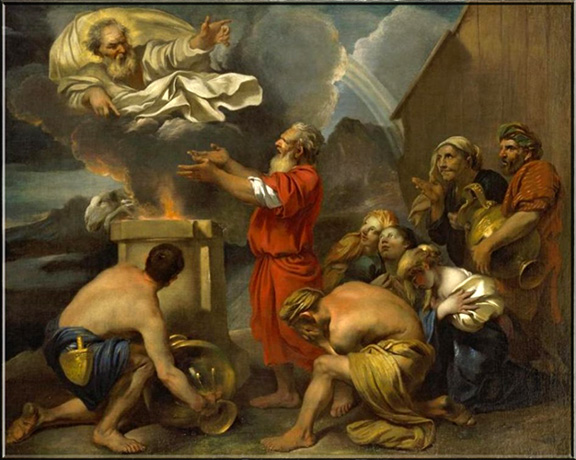
Noah's Offering to God after the Deluge
In the time of Noah, the entire human race was submerged by the Deluge, and only eight people were saved in the Ark. Saint Peter says, "This ark was the figure of the Church," while Saint Augustine adds, "And these eight people who were saved signify that very few Christians are saved, because there are very few who sincerely renounce the world, and those who renounce it only in words do not belong to the mystery represented by that ark."
Brothers, because of the love I have for you, I wish I were able to reassure you with the prospect of eternal happiness by saying to each of you: You are certain to go to paradise; the greater number of Christians is saved, so you also will be saved. But how can I give you this sweet assurance if you revolt against God's decrees as though you were your own worst enemies? I observe in God a sincere desire to save you, but I find in you a decided inclination to be damned. So what will I be doing today if I speak clearly? I will be displeasing to you. But if I do not speak, I will be displeasing to God.
Therefore, I will divide this subject into two points. In the first one, to fill you with dread, I will let the theologians and Fathers of the Church decide on the matter and declare that the greater number of Christian adults are damned; and, in silent adoration of that terrible mystery, I will keep my own sentiments to myself. In the second point I will attempt to defend the goodness of God versus the godless, by proving to you that those who are damned are damned by their own malice, because they wanted to be damned. So then, here are two very important truths. If the first truth frightens you, do not hold it against me, as though I wanted to make the road of heaven narrower for you, for I want to be neutral in this matter; rather, hold it against the theologians and Fathers of the Church who will engrave this truth in your heart by the force of reason. If you are disillusioned by the second truth, give thanks to God over it, for He wants only one thing: that you give your hearts totally to Him. Finally, if you oblige me to tell you clearly what I think, I will do so for your consolation.
Pious souls, you may leave; this sermon is not for you. Its sole purpose is to contain the pride of libertines who cast the holy fear of God out of their heart and join forces with the devil who, according to the sentiment of Eusebius, damns souls by reassuring them. To resolve this doubt, let us put the Fathers of the Church, both Greek and Latin, on one side; on the other, the most learned theologians and erudite historians; and let us put the Bible in the middle for all to see. Now listen not to what I will say to you -- for I have already told you that I do not want to speak for myself or decide on the matter -- but listen to what these great minds have to tell you, they who are beacons in the Church of God to give light to others so that they will not miss the road to heaven. In this manner, guided by the triple light of faith, authority and reason, we will be able to resolve this grave matter with certainty.
Note well that there is no question here of the human race taken as a whole, nor of all Catholics taken without distinction, but only of Catholic adults, who have free choice and are thus capable of cooperating in the great matter of their salvation. First let us consult the theologians recognized as examining things most carefully and as not exaggerating in their teaching: let us listen to two learned cardinals, Cajetan and Bellarmine. They teach that the greater number of Christian adults are damned, and if I had the time to point out the reasons upon which they base themselves, you would be convinced of it yourselves. But I will limit myself here to quoting Suarez. After consulting all the theologians and making a diligent study of the matter, he wrote, "The most common sentiment which is held is that, among Christians, there are more damned souls than predestined souls."
Add the authority of the Greek and Latin Fathers to that of the theologians, and you will find that almost all of them say the same thing. This is the sentiment of Saint Theodore, Saint Basil, Saint Ephrem, and Saint John Chrysostom. What is more, according to Baronius it was a common opinion among the Greek Fathers that this truth was expressly revealed to Saint Simeon Stylites and that after this revelation, it was to secure his salvation that he decided to live standing on top of a pillar for forty years, exposed to the weather, a model of penance and holiness for everyone. Now let us consult the Latin Fathers. You will hear Saint Gregory saying clearly, "Many attain to faith, but few to the heavenly kingdom." Saint Anselm declares, "There are few who are saved." Saint Augustine states even more clearly, "Therefore, few are saved in comparison to those who are damned." The most terrifying, however, is Saint Jerome. At the end of his life, in the presence of his disciples, he spoke these dreadful words: "Out of one hundred thousand people whose lives have always been bad, you will find barely one who is worthy of indulgence."
I would not finish if I had to point out all the figures by which Holy Scripture confirms this truth; let us content ourselves with listening to the living oracle of Incarnate Wisdom. What did Our Lord answer the curious man in the Gospel who asked Him, "Lord, is it only a few to be saved?" Did He keep silence? Did He answer haltingly? Did He conceal His thought for fear of frightening the crowd? No. Questioned by only one, He addresses all of those present. He says to them: "You ask Me if there are only few who are saved?" Here is My answer: "Strive to enter by the narrow gate; for many, I tell you, will seek to enter and will not be able." Who is speaking here? It is the Son of God, Eternal Truth, who on another occasion says even more clearly, "Many are called, but few are chosen." He does not say that all are called and that out of all men, few are chosen, but that many are called; which means, as Saint Gregory explains, that out of all men, many are called to the True Faith, but out of them few are saved. Brothers, these are the words of Our Lord Jesus Christ. Are they clear? They are true. Tell me now if it is possible for you to have faith in your heart and not tremble.
Look higher still, and see the prelates of the Holy Church, pastors who have the charge of souls. Is the number of those who are saved among them greater than the number of those who are damned? Listen to Cantimpre; he will relate an event to you, and you may draw the conclusions. There was a synod being held in Paris, and a great number of prelates and pastors who had the charge of souls were in attendance; the king and princes also came to add luster to that assembly by their presence. A famous preacher was invited to preach. While he was preparing his sermon, a horrible demon appeared to him and said, "Lay your books aside. If you want to give a sermon that will be useful to these princes and prelates, content yourself with telling them on our part, 'We the princes of darkness thank you, princes, prelates, and pastors of souls, that due to your negligence, the greater number of the faithful are damned; also, we are saving a reward for you for this favor, when you shall be with us in Hell.'"
Woe to you who command others! If so many are damned by your fault, what will happen to you? If few out of those who are first in the Church of God are saved, what will happen to you? Take all states, both sexes, every condition: husbands, wives, widows, young women, young men, soldiers, merchants, craftsmen, rich and poor, noble and plebian. What are we to say about all these people who are living so badly? The following narrative from Saint Vincent Ferrer will show you what you may think about it. He relates that an archdeacon in Lyons gave up his charge and retreated into a desert place to do penance, and that he died the same day and hour as Saint Bernard. After his death, he appeared to his bishop and said to him, "Know, Monsignor, that at the very hour I passed away, thirty-three thousand people also died. Out of this number, Bernard and myself went up to heaven without delay, three went to purgatory, and all the others fell into Hell."
Our chronicles relate an even more dreadful happening. One of our brothers, well-known for his doctrine and holiness, was preaching in Germany. He represented the ugliness of the sin of impurity so forceful that a woman fell dead of sorrow in front of everyone. Then, coming back to life, she said, "When I was presented before the Tribunal of God, sixty thousand people arrived at the same time from all parts of the world; out of that number, three were saved by going to Purgatory, and all the rest were damned."
O abyss of the judgments of God! Out of thirty thousand, only five were saved! And out of sixty thousand, only three went to heaven! You sinners who are listening to me, in what category will you be numbered?... What do you say?... What do you think?...
I see almost all of you lowering your heads, filled with astonishment and horror. But let us lay our stupor aside, and instead of flattering ourselves, let us try to draw some profit from our fear. Is it not true that there are two roads which lead to heaven: innocence and repentance? Now, if I show you that very few take either one of these two roads, as rational people you will conclude that very few are saved. And to mention proofs: in what age, employment or condition will you find that the number of the wicked is not a hundred times greater than that of the good, and about which one might say, "The good are so rare and the wicked are so great in number"? We could say of our times what Salvianus said of his: it is easier to find a countless multitude of sinners immersed in all sorts of iniquities than a few innocent men. How many servants are totally honest and faithful in their duties? How many merchants are fair and equitable in their commerce; how many craftsmen exact and truthful; how many salesmen disinterested and sincere? How many men of law do not forsake equity? How many soldiers do not tread upon innocence; how many masters do not unjustly withhold the salary of those who serve them, or do not seek to dominate their inferiors? Everywhere, the good are rare and the wicked great in number. Who does not know that today there is so much libertinage among mature men, liberty among young girls, vanity among women, licentiousness in the nobility, corruption in the middle class, dissolution in the people, impudence among the poor, that one could say what David said of his times: "All alike have gone astray... there is not even one who does good, not even one."
Go into street and square, into palace and house, into city and countryside, into tribunal and court of law, and even into the temple of God. Where will you find virtue? "Alas!" cries Salvianus, "except for a very little number who flee evil, what is the assembly of Christians if not a sink of vice?" All that we can find everywhere is selfishness, ambition, gluttony, and luxury. Is not the greater portion of men defiled by the vice of impurity, and is not Saint John right in saying, "The whole world -- if something so foul may be called -- "is seated in wickedness?" I am not the one who is telling you; reason obliges you to believe that out of those who are living so badly, very few are saved.
But you will say: Can penance not profitably repair the loss of innocence? That is true, I admit. But I also know that penance is so difficult in practice, we have lost the habit so completely, and it is so badly abused by sinners, that this alone should suffice to convince you that very few are saved by that path. Oh, how steep, narrow, thorny, horrible to behold and hard to climb it is! Everywhere we look, we see traces of blood and things that recall sad memories. Many weaken at the very sight of it. Many retreat at the very start. Many fall from weariness in the middle, and many give up wretchedly at the end. And how few are they who persevere in it till death! Saint Ambrose says it is easier to find men who have kept their innocence than to find any who have done fitting penance.
If you consider the sacrament of penance, there are so many distorted confessions, so many studied excuses, so many deceitful repentances, so many false promises, so many ineffective resolutions, so many invalid absolutions! Would you regard as valid the confession of someone who accuses himself of sins of impurity and still holds to the occasion of them? Or someone who accuses himself of obvious injustices with no intention of making any reparation whatsoever for them? Or someone who falls again into the same iniquities right after going to confession? Oh, horrible abuses of such a great sacrament! One confesses to avoid excommunication, another to make a reputation as a penitent. One rids himself of his sins to calm his remorse, another conceals them out of shame. One accuses them imperfectly out of malice, another discloses them out of habit. One does not have the true end of the sacrament in mind, another is lacking the necessary sorrow, and still another firm purpose. Poor confessors, what efforts you make to bring the greater number of penitents to these resolutions and acts, without which confession is a sacrilege, absolution a condemnation and penance an illusion?
Where are they now, those who believe that the number of the saved among Christians is greater than that of the damned and who, to authorize their opinion, reason thus: the greater portion of Catholic adults die in their beds armed with the sacraments of the Church, therefore most adult Catholics are saved? Oh, what fine reasoning! You must say exactly the opposite. Most Catholic adults confess badly at death, therefore most of them are damned. I say "all the more certain," because a dying person who has not confessed well when he was in good health will have an even harder time doing so when he is in bed with a heavy heart, an unsteady head, a muddled mind; when he is opposed in many ways by still-living objects, by still-fresh occasions, by adopted habits, and above all by devils who are seeking every means to cast him into hell. Now, if you add to all these false penitents all the other sinners who die unexpectedly in sin, due to the doctors' ignorance or by their relatives' fault, who die from poisoning or from being buried in earthquakes, or from a stroke, or from a fall, or on the battlefield, in a fight, caught in a trap, struck by lightning, burned or drowned, are you not obliged to conclude that most Christian adults are damned? That is the reasoning of Saint Chrysostom. This Saint says that most Christians are walking on the road to hell throughout their life. Why, then, are you so surprised that the greater number goes to hell? To come to a door, you must take the road that leads there. What have you to answer such a powerful reason?
The answer, you will tell me, is that the mercy of God is great. Yes, for those who fear Him, says the Prophet; but great is His justice for the one who does not fear Him, and it condemns all obstinate sinners.
So you will say to me: Well then, who is Paradise for, if not for Christians? It is for Christians, of course, but for those who do not dishonor their character and who live as Christians. Moreover, if to the number of Christian adults who die in the grace of God, you add the countless host of children who die after baptism and before reaching the age of reason, you will not be surprised that Saint John the Apostle, speaking of those who are saved, says, "I saw a great multitude which no man could number."
And this is what deceives those who pretend that the number of the saved among Catholics is greater than that of the damned... If to that number, you add the adults who have kept the robe of innocence, or who after having defiled it, have washed it in the tears of penance, it is certain that the greater number is saved; and that explains the words of Saint John, "I saw a great multitude," and these other words of Our Lord, "Many will come from the east and from the west, and will feast with Abraham and Isaac and Jacob in the kingdom of heaven," and the other figures usually cited in favor of that opinion. But if you are talking about Christian adults, experience, reason, authority, propriety and Scripture all agree in proving that the greater number is damned. Do not believe that because of this, paradise is empty; on the contrary, it is a very populous kingdom. And if the damned are "as numerous as the sand in the sea," the saved are "as numerous at the stars of heaven," that is, both the one and the other are countless, although in very different proportions.
One day Saint John Chrysostom, preaching in the cathedral in Constantinople and considering these proportions, could not help but shudder in horror and ask, "Out of this great number of people, how many do you think will be saved?" And, not waiting for an answer, he added, "Among so many thousands of people, we would not find a hundred who are saved, and I even doubt for the one hundred." What a dreadful thing! The great Saint believed that out of so many people, barely one hundred would be saved; and even then, he was not sure of that number. What will happen to you who are listening to me? Great God, I cannot think of it without shuddering! Brothers, the problem of salvation is a very difficult thing; for according to the maxims of the theologians, when an end demands great efforts, few only attain it.
That is why Saint Thomas, the Angelic Doctor, after weighing all the reasons pro and con in his immense erudition, finally concludes that the greater number of Catholic adults are damned. He says, "Because eternal beatitude surpasses the natural state, especially since it has been deprived of original grace, it is the little number that are saved."
So then, remove the blindfold from your eyes that is blinding you with self-love, that is keeping you from believing such an obvious truth by giving you very false ideas concerning the justice of God, "Just Father, the world has not known Thee," said Our Lord Jesus Christ. He does not say "Almighty Father, most good and merciful Father." He says "just Father," so we may understand that out of all the attributes of God, none is less known than His justice, because men refuse to believe what they are afraid to undergo. Therefore, remove the blindfold that is covering your eyes and say tearfully: Alas! The greater number of Catholics, the greater number of those who live here, perhaps even those who are in this assembly, will be damned! What subject could be more deserving of your tears?
King Xerxes, standing on a hill looking at his army of one hundred thousand soldiers in battle array, and considering that out of all of them there would be not one man alive in a hundred years, was unable to hold back his tears. Have we not more reason to weep upon thinking that out of so many Catholics, the greater number will be damned? Should this thought not make our eyes pour forth rivers of tears, or at least produce in our heart the sentiment of compassion felt by an Augustinian Brother, Ven. Marcellus of St. Dominic? One day as he was meditating on the eternal pains, the Lord showed him how many souls were going to hell at that moment and had him see a very broad road on which twenty-two thousand reprobates were running toward the abyss, colliding into one another. The servant of God was stupefied at the sight and exclaimed, "Oh, what a number! What a number! And still more are coming. O Jesus! O Jesus! What madness!" Let me repeat with Jeremiah, "Who will give water to my head, and a fountain of tears to my eyes? And I will weep day and night for the slain of the daughter of my people."
Poor souls! How can you run so hastily toward hell? For mercy's sake, stop and listen to me for a moment! Either you understand what it means to be saved and to be damned for all eternity, or you do not. If you understand and in spite of that, you do not decide to change your life today, make a good confession and trample upon the world, in a word, make your every effort to be counted among the littler number of those who are saved, I say that you do not have the faith. You are more excusable if you do not understand it, for then one must say that you are out of your mind. To be saved for all eternity, to be damned for all eternity, and to not make your every effort to avoid the one and make sure of the other, is something inconceivable.
So what must we do, we who know that the greater number is going to be damned, and not only out of all Catholics? What must we do? Take the resolution to belong to the little number of those who are saved. You say: If Christ wanted to damn me, then why did He create me? Silence, rash tongue! God did not create anyone to damn him; but whoever is damned, is damned because he wants to be. Therefore, I will now strive to defend the goodness of my God and Aquit it of all blame: that will be the subject of the second point.
Before going on, let us gather on one side all the books and all the heresies of Luther and Calvin, and on the other side the books and heresies of the Pelagians and Semi-Pelagians, and let us burn them. Some destroy grace, others freedom, and all are filled with errors; so let us cast them into the fire. All the damned bear upon their brow the oracle of the Prophet Osee, "Thy damnation comes from thee," so that they may understand that whoever is damned, is damned by his own malice and because he wants to be damned.
First let us take these two undeniable truths as a basis: "God wants all men to be saved," "All are in need of the grace of God." Now, if I show you that God wants to save all men, and that for this purpose He gives all of them His grace and all the other necessary means of obtaining that sublime end, you will be obliged to agree that whoever is damned must impute it to his own malice, and that if the greater number of Christians are damned, it is because they want to be. "Thy damnation comes from thee; thy help is only in Me."
Far more, because God sees that we could not even make use of His grace without His help, He gives us other aids; and if they sometimes remain ineffective, it is our fault; for with these same aids, one may abuse them and be damned with them, and another may do right and be saved; he might even be saved with less powerful aids. Yes, it can happen that we abuse a greater grace and are damned, whereas another cooperates with a lesser grace and is saved.
Saint Augustine exclaims, "If, therefore, someone turns aside from justice, he is carried by his free will, led by his concupiscence, deceived by his own persuasion." But for those who do not understand theology, here is what I have to say to them: God is so good that when He sees a sinner running to his ruin, He runs after him, calls him, entreats and accompanies him even to the gates of hell; what will He not do to convert him? He sends him good inspirations and holy thoughts, and if he does not profit from them, He becomes angry and indignant, He pursues him. Will He strike him? No. He beats at the air and forgives him. But the sinner is not converted yet. God sends him a mortal illness. It is certainly all over for him. No, brothers, God heals him; the sinner becomes obstinate in evil, and God in His mercy looks for another way; He gives him another year, and when that year is over, He grants him yet another.
But if the sinner still wants to cast himself into hell in spite of all that, what does God do? Does He abandon him? No. He takes him by the hand; and while he has one foot in hell and the other outside, He still preaches to him, He implored him not to abuse His graces. Now I ask you, if that man is damned, is it not true that he is damned against the Will of God and because he wants to be damned? Come and ask me now: If God wanted to damn me, then why did He create me?
Ungrateful sinner, learn today that if you are damned, it is not God who is to blame, but you and your self-will. To persuade yourself of this, go down even to the depths of the abyss, and there I will bring you one of those wretched damned souls burning in hell, so that he may explain this truth to you. Here is one now: "Tell me, who are you?" "I am a poor idolater, born in an unknown land; I never heard of heaven or hell, nor of what I am suffering now." "Poor wretch! Go away, you are not the one I am looking for." Another one is coming; there he is. "Who are you?" "I am a schismatic from the ends of Tartary; I always lived in an uncivilized state, barely knowing that there is a God." "You are not the one I want; return to hell." Here is another. "And who are you?" "I am a poor heretic from the North. I was born under the Pole and never saw either the light of the sun or the light of faith." "It is not you that I am looking for either, return to Hell." Brothers, my heart is broken upon seeing these wretches who never even knew the True Faith among the damned. Even so, know that the sentence of condemnation was pronounced against them and they were told, "Thy damnation comes from thee." They were damned because they wanted to be. They received so many aids from God to be saved! We do not know what they were, but they know them well, and now they cry out, "O Lord, Thou art just... and Thy judgments are equitable."
Brothers, you must know that the most ancient belief is the Law of God, and that we all bear it written in our hearts; that it can be learned without any teacher, and that it suffices to have the light of reason in order to know all the precepts of that Law. That is why even the barbarians hid when they committed sin, because they knew they were doing wrong; and they are damned for not having observed the natural law written in their heart: for had they observed it, God would have made a miracle rather than let them be damned; He would have sent them someone to teach them and would have given them other aids, of which they made themselves unworthy by not living in conformity with the inspirations of their own conscience, which never failed to warn them of the good they should do and the evil they should avoid. So it is their conscience that accused them at the Tribunal of God, and it tells them constantly in hell, "Thy damnation comes from thee." They do not know what to answer and are obliged to confess that they are deserving of their fate. Now if these infidels have no excuse, will there be any for a Catholic who had so many sacraments, so many sermons, so many aids at his disposal? How will he dare to say, "If God was going to damn me, then why did He create me?" How will he dare to speak in this manner, when God gives him so many aids to be saved? So let us finish confounding him.
You who are suffering in the abyss, answer me! Are there any Catholics among you? "There certainly are!" How many? Let one of them come here! "That is impossible, they are too far down, and to have them come up would turn all of hell upside down; it would be easier to stop one of them as he is falling in." So then, I am speaking to you who live in the habit of mortal sin, in hatred, in the mire of the vice of impurity, and who are getting closer to hell each day. Stop, and turn around; it is Jesus who calls you and who, with His wounds, as with so many eloquent voices, cries to you, "My son, if you are damned, you have only yourself to blame: 'Thy damnation comes from thee.' Lift up your eyes and see all the graces with which I have enriched you to insure your eternal salvation. I could have had you born in a forest in Barbary; that is what I did to many others, but I had you born in the Catholic Faith; I had you raised by such a good father, such an excellent mother, with the purest instructions and teachings. If you are damned in spite of that, whose fault will it be? Your own, My son, your own: 'Thy damnation comes from thee.'
"I could have cast you into hell after the first mortal sin you committed, without waiting for the second: I did it to so many others, but I was patient with you, I waited for you for many long years. I am still waiting for you today in penance. If you are damned in spite of all that, whose fault is it? Your own, My son, your own: "Thy damnation comes from thee." You know how many have died before your very eyes and were damned: that was a warning for you. You know how many others I set back on the right path to give you the good example. Do you remember what that excellent confessor told you? I am the one who had him say it. Did he not enjoin you to change your life, to make a good confession? I am the One who inspired him. Remember that sermon that touched your heart? I am the One who led you there. And what has happened between you and Me in the secret of your heart, ...that you can never forget.
"Those interior inspirations, that clear knowledge, that constant remorse of conscience, would you dare to deny them? All of these were so many aids of My grace, because I wanted to save you. I refused to give them to many others, and I gave them to you because I loved you tenderly. My son, My son, if I spoke to them as tenderly as I am speaking to you today, how many others souls return to the right path! And you... you turn your back on Me. Listen to what I am going to tell you, for these are My last words: You have cost Me My blood; if you want to be damned in spite of the blood I shed for you, do not blame Me, you have only yourself to accuse; and throughout all eternity, do not forget that if you are damned in spite of Me, you are damned because you want to be damned: 'Thy damnation comes from thee.' "
O my good Jesus, the very stones would split on hearing such sweet words, such tender expressions. Is there anyone here who wants to be damned, with so many graces and aids? If there is one, let him listen to me, and then let him resist if he can.
Baronius relates that after Julian the Apostate's infamous apostasy, he conceived such great hatred against Holy Baptism that day and night, he sought a way in which he might erase his own. To that purpose he had a bath of goat's blood prepared and placed himself in it, wanting this impure blood of a victim consecrated to Venus to erase the sacred character of Baptism from his soul. Such behavior seems abominable to you, but if Julian's plan had been able to succeed, it is certain that he would be suffering much less in hell.
Sinners, the advice I want to give you will no doubt seem strange to you; but if you understand it well, it is, on the contrary, inspired by tender compassion toward you. I implore you on my knees, by the blood of Christ and by the Heart of Mary, change your life, come back to the road that leads to heaven, and do all you can to belong to the little number of those who are saved. If, instead of this, you want to continue walking on the road that leads to hell, at least find a way to erase your baptism. Woe to you if you take the Holy Name of Jesus Christ and the sacred character of the Christian engraved upon your soul into hell! Your chastisement will be all the greater. So do what I advise you to do: if you do not want to convert, go this very day and ask your pastor to erase your name from the baptismal register, so that there may not remain any remembrance of your ever having been a Christian; implore your Guardian Angel to erase from his book of graces the inspirations and aids he has given you on orders from God, for woe to you if he recalls them! Tell Our Lord to take back His faith, His baptism, His sacraments.
You are horror-struck at such a thought? Well then, cast yourself at the feet of Jesus Christ and say to Him, with tearful eyes and contrite heart: "Lord, I confess that up till now I have not lived as a Christian. I am not worthy to be numbered among Your elect. I recognize that I deserve to be damned; but Your mercy is great and, full of confidence in Your grace, I say to You that I want to save my soul, even if I have to sacrifice my fortune, my honor, my very life, as long as I am saved. If I have been unfaithful up to now, I repent, I deplore, I detest my infidelity, I ask You humbly to forgive me for it. Forgive me, good Jesus, and strengthen me also, that I may be saved. I ask You not for wealth, honor or prosperity; I ask you for one thing only, to save my soul."
And You, O Jesus! What do You say? O Good Shepherd, see the stray sheep who returns to You; embrace this repentant sinner, bless his sighs and tears, or rather bless these people who are so well disposed and who want nothing but their salvation. Brothers, at the feet of Our Lord, let us protest that we want to save our soul, cost what it may. Let us all say to Him with tearful eyes, "Good Jesus, I want to save my soul," O blessed tears, O blessed sighs!
Now imagine the same Angel returning to you and confirming the second opinion. He tells you that not only are the greater portion of Catholics saved, but that out of all this gathering, one alone will be damned and all the others saved. If after that, you continue your usuries, your vengeances, your criminal deeds, your impurities, then you will be that one alone who is damned.
What is the use of knowing whether few or many are saved? Saint Peter says to us, "Strive by good works to make your election sure." When Saint Thomas Aquinas's sister asked him what she must do to go to heaven, he said, "You will be saved if you want to be." I say the same thing to you, and here is proof of my declaration. No one is damned unless he commits mortal sin: that is of faith. And no one commits mortal sin unless he wants to: that is an undeniable theological proposition. Therefore, no one goes to hell unless he wants to; the consequence is obvious. Does that not suffice to comfort you? Weep over past sins, make a good confession, sin no more in the future, and you will all be saved. Why torment yourself so? For it is certain that you have to commit mortal sin to go to hell, and that to commit mortal sin you must want to, and that consequently no one goes to hell unless he wants to. That is not just an opinion, it is an undeniable and very comforting truth; may God give you to understand it, and may He bless you. Amen.
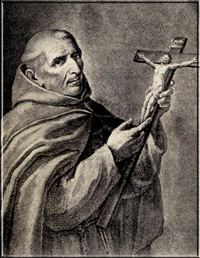
About the Author: St. Leonard of Port Maurice
From the Catholic Encyclopedia, 1913
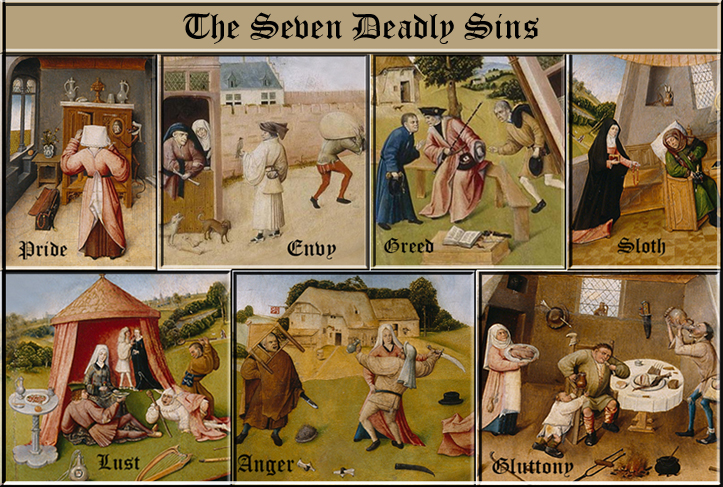
The Sin Unto Death
by Cardinal Henry Manning, 1874
Our next subject, as I said, is mortal sin. But before I enter upon it, I wish to recall to your memories the general principles already laid down. First, we know that the end of man is God; that God made man for Himself; that He made him to His own likeness; that He made him capable of knowing, loving, and serving Him, and of being like to God; and that in the knowledge, the love, and the service, and the likeness of God, is the bliss of man. Therefore conformity to God is our perfection, and union with God is eternal life; but deformity, or departure from the likeness of God, is sin, and separation from God is eternal death. The nature of sin is, as we have defined it, the transgression of the law of God; or, in other words, any thought, word, or deed deliberately committed with the knowledge of the intellect, and the consent of the will, contrary to the will of God; or, in other words again, it is the variance of the created will against the uncreated will--of the will of the creature against the will of the Creator. The essential malice of sin, then, consists in the variance of the will, the hostility of the will of the creature against the will of his Maker. These were the principles which I laid down last time. We will now take them up again, and make application of them in one particular point.
Saint John, in the words with which I began, tells us that if any man see his brother sin a sin which is not unto death, he ought to pray for him. Now what are the sins that are not unto death? Sins of infirmity; sins of impetuosity; sins of strong temptation; sins which by the subtilty of Satan lead men astray; sins of passion, in which human nature, being weak and tempestuous and liable to disorder, is drawn aside: if in all these there be no malice, either against God, or against our neighbour. Now these are sins which all Christians are liable to commit, and do commit, and which, without doubt, you yourselves are profoundly conscious of committing. These are sins not unto death, as we may trust, because if there be no malice against God or our neighbour, then the essential sinfulness of sin is wanting; and in that case, Saint John says, 'Let him pray for him, and God will give life unto those that sin not unto death;' that is to say, He will give grace, sorrow, pardon, help, protection, and perseverance. He will watch over those souls if in humility and in sorrow they persevere; and the prayer of those who are faithful and steadfast will obtain grace for those that sin not unto death.
Then he goes on: 'There is a sin unto death: for that I say not that any man should ask that is, that any man should pray. Now what is this sin unto death? The sin of Judas was a sin unto death. With his eyes open, with a knowledge of his Master,--though perhaps he did not know of the mystery of the Incarnation as we know it now; nevertheless he knew enough,--he sold his Master, and yet perhaps not knowing that he sold Him to be crucified. This, then, was a sin unto death. The sin of Simon Magus was a blasphemy and a sin unto death. The sin of those that blaspheme the Holy Ghost, which shall never be forgiven, is a sin unto death. The sin of apostates from the faith, who, having known the truth, and having had the full light and illumination to know God, afterwards fall from Him, is described by Saint Paul in the Epistle to the Hebrews, where he says, 'It is impossible for those who have been once enlightened, and have tasted of the Heavenly Gift, and of the good Word of God, and of the powers of the world to come, if they shall fall away, to be renewed again unto repentance (Heb. vi. 6).'
In one word, all who are impenitent sin unto death. All those who, having had full light and knowledge of God in His revelation, with their eyes open, turn from it, of whom Saint John says, 'They went out from us because they were not of us; for if they had been of us, without doubt they would have continued with us (1 St. John ii. 10)'--all these who so sin, sin unto death, and are left to the judgment of God. Saint John in these words does not forbid us to pray; he says, 'I do not say'--that is, 'I do not enjoin it.' He leaves it to the conscience of every man. He says of those who sin not unto death, that 'we have all confidence we may obtain pardon and grace for them;' but for those who do sin unto death as I have described, 'we have no such confidence, and therefore, though I do not enjoin it, I do not forbid it.'
Then he goes on to say, 'All iniquity is sin.' Now iniquity means all departure from the rectitude of God and of the law of God. Iniquity is inequality, or crookedness. Everything that is not conformed to the rectitude of God, to His perfections, to His law, and to His will, is sin. 'And there is a sin unto death.' We have here a distinction of those sins which are and those which are not mortal. My purpose now is very roughly to define what it is that constitutes this distinction; and secondly, to show what are the effects of this mortal sin which is unto death.
As I have said before, to constitute a mortal sin it is necessary that the man who commits it should know what he does--there must be a knowledge of the intellect; if not, the sin is only, as I then said, a material sin, and not a formal sin, unless his ignorance be a culpable and guilty ignorance. Next, he must not only know that he is doing wrong, but his will must consent to the wrong-doing. Thirdly, he must know and consent deliberately, with such an advertence or attention to what he is about as to make him conscious of his action. A man who should transgress the law of God in the least possible way would fulfil these three conditions. It would be a transgression of the law of God if I should take an apple off the tree of my neighbour without his leave. It was his: I had not a right to take it, and I thereby broke the commandment, 'Thou shalt not steal;' but that certainly would not be a sin unto death. It became a sin unto death when a divine prohibition was laid upon such an act under pain of death, and that the pain of eternal death; but where there is no such command laid under pain of death, it is quite clear that the taking of an apple would not constitute a sin unto death.
Therefore it is necessary that there should be a gravity in the matter of the sin; and the gravity of that matter will be constituted in one of two ways--it is either the material gravity, that is, the extent, or amount, or quantity of the sin committed; or it is the moral gravity derived from the circumstances of the case. An illustration will at once make this clear. If I were to rob a man of a very large amount of his property, no one would doubt for an instant that I had committed a sin unto death, or a mortal sin. The common sense of mankind, the instincts of justice, would at once pronounce against me. If I were to take a needle from some rich person, the instincts of justice would Aquit me of a sin unto death. I have taken that which did not belong to me, but no one would say that, in taking that needle from the rich man, who could obtain an abundant supply of needles, I had committed a sin unto death. No. But suppose that needle belonged to a poor seamstress, who gained her daily bread by the industrious use of that one needle, and that she had not the means to buy another; and that if she were robbed of it, her industry must cease, and she could no longer gain her bread; and that I knew all those facts; and that, with my eyes open, knowing the extent of the injury I was doing, in violation of the law of charity, as well as of the law of justice, I should take that needle with a perfect consciousness that I was destroying the means of industry and reducing her to hunger. You see at once that there is a moral guilt which arises from these circumstances. Suppose, still further, that I myself were jealous of her prosperity, being of the same trade or calling, and that I take the needle in order to ruin her for my own advantage. You see, therefore, that in so small a theft as the stealing of a needle there may be an enormity of moral guilt. It is not enough then that there should be the knowledge of the intellect, and the consent of the will to the action, unless the matter in which that action is committed shall be of a grave kind, either materially or morally, before God.
There are seven capital sins, the names of which you all know. First of all there is pride, which separates the soul from God; secondly, there is envy, or jealousy, which separates a man from his neighbour; thirdly, there is sloth, which is a burden pressing down the powers of man, so that he becomes weary of his duty towards God, and forsakes Him; fourthly, there is avarice, which plunges a man deep into the mire of this world, so that he makes it to be his god; fifthly, there is gluttony, which makes a sensual fool; sixthly, there is anger, which makes a man a slave to himself; and lastly, there is impurity, which makes a man a slave of the devil. In those seven kinds there are seven ways of eternal death; and all those who, with their eyes open, with the knowledge of the intellect, and the full consent of the will, commit sin in any of those seven kinds, are walking in the way towards sin unto death.
1. We come now to the effects. The first effect of one mortal sin is to strike the soul dead. The grace of God is the life of the soul as the soul is the life of the body; and one sin unto death, in any one of the kinds that I have spoken of, strikes the soul dead. The soul dies at once, and on the spot; not as the tree which is blasted by the lightning and dies gradually day after day; first in the leader, then it begins to die in the branches, and then it dies in the trunk, and then it dies in the root. This is a slow process, but not so with the soul. One single sin unto death strikes the soul dead at once, and that for this reason: the grace of God is the life of the soul, and one mortal sin separates the soul from God. The holy angels, when they were created, lived in the presence of God, though they did not as yet see the face of God. They were on probation. Every creature depends on God in two ways: he needs the support of God for his existence; and of the grace of God for his sanctification. If God were not present with us at this moment in our physical life we should die. If He were not in this building, the walls of it would vanish. So it was with the angels in their first state of bliss. It was the assistance of God which sustained them in their being as pure intelligences, spotless in their innocence, excellent in their strength, surpassing in their energy. 'He maketh His angels spirits, and His ministers a flame of fire (Heb. i. 7.).' They also needed grace. The angels were holy just as we are holy, because the Holy Ghost was with them; and all the actions of the angelic perfection were sustained by an actual grace and help of God, just like our own. By one sin--one sin unto death--and that a sin of pride, purely spiritual, they fell and died eternally and without redemption; and as S. Jude writes: 'Leaving their habitations, were cast down into darkness and everlasting chains until the day of judgment (St. Jude 6.).'
As it was with the angelic natures, so it was with man. God, when He created man, constituted him, as I said before, with three perfections--the perfection of nature, that is, of body and soul; the supernatural perfection or the indwelling of the Holy Ghost and of sanctification; and the preternatural perfection or the perfect harmony of the soul in itself and with God; and the immortality of the body. These three perfections, natural, supernatural, and preternatural, make up what is called original justice; and in that state man was constituted when he was created. But by one sin of disobedience, with his eyes open, with the consent of his will and with full deliberation--and that in a matter light in itself, as I have said, but grave because the prohibition of God under the penalty of eternal death was laid upon it--in that slight trial, without temptation save only the listening to the tempter, who awakened a spirit of curiosity and disobedience, where all around him was permitted and one only thing forbidden, man sinned against God, and by that one sin was struck dead. The Holy Ghost departed from him, and all his perfections were wrecked. The supernatural perfection was lost, the preternatural perfection was forfeited, the soul fell from God, the body was struck by death. He became from that time disinherited, shorn of sanctity and life: one sin unto death separated him and all his posterity from God.
As it was in the case of Adam, so it is also in the case of the regenerate; so it is in our own. We who are born, into the world, spiritually dead have once more, by regeneration in baptism, the life of the Spirit. If we sin mortally with our eyes open, and with consent of our will, we forfeit the presence of the Holy Ghost in the soul, the charity of God which unites us to Him, the sanctifying grace whereby we are made children of God, the seven gifts of the Holy Ghost which are always inseparably united to His presence. There is left in us, indeed, the grace of hope and the grace of faith. These two remain like the beating of the pulse and the breathing of the lungs: there is just so much left of the life of grace with the light of faith and the aspiration of hope after God; but our union with God is broken: we are separated from Him, and at variance with Him. This is the first effect of mortal sin; for habitual grace and the presence of God are the life of the soul; and the loss of that grace, which is the loss of the presence of God, is the death of the soul.
2. But further: one mortal sin destroys all the merits that the soul has ever heaped up. Understand what is meant by merit. The doctrine of the Catholic Church is this: not that any creature can merit in the sense of claiming out of the hand of his Maker, Redeemer, and Judge, by any right of his own, anything whatsoever in nature or in grace. Cast out of your minds for ever all shadow of misunderstanding upon this. Merit does not signify that the creature can by any right of his own, either in the order of nature or of grace, challenge and demand of God the gift or the possession of anything. No. The word 'merit' is used in two senses. There is the merit for good, and the merit for evil. Every good action has a merit--that is, a certain conformity to the will of God; and every evil action has a merit, that is, a deformity, which will be followed by punishment. Therefore 'merit' is a word altogether indifferent in itself, and derives its meaning for good or for evil from its context. Merit signifies the connection or link that exists between certain actions done in grace and certain awards; and that connection or link is constituted sovereignly and gratuitously by the grace and promise of God. So that every man who does acts of faith, or of charity, or of self-denial, or of piety, will receive a reward, both in this life and the next, according to those actions. Every man who does acts of charity will receive an increase of charity and of grace in this life; and hereafter, as the Council of Florence defines, the glory of the blessed shall be in proportion to the measure of their charity on earth. There is a link then between the measure of our charity here and the measure of our glory hereafter. This is what is called merit; and all through our life, if we are living faithfully in the grace of God, we are thereby heaping up merits, and Aquiring in virtue of the promise a greater reward and a greater bliss.
I may give as example the life of the Apostles, who, through the whole of their career, even to their martyrdom, were continually increasing in the sight of God the accumulation of His good-will, of His grace, and of His reward. This is true of you all, and through your whole life everything that you do according to the will of God, being in a state of grace, has in the Book of Remembrance a record, and in the Sacred Heart of our Divine Master a promise of reward, which shall be satisfied at His coming. One sin then, unto death, unless afterwards repented of, utterly cancels all these merits of a whole life. It matters not how long you may have been living a life of justice, of charity, of humility, of generosity, and of piety, before God--one mortal sin, and the whole of that record is cancelled from the Book of His remembrance. It is all gone as if it had never been. Do you need proofs of it? Take the history of David, the 'man after God's own heart (Acts xiii. 22).' You remember his faith, his patience, his fidelity, his courage, his prayer, his spirit of thanksgiving. He is the Psalmist of Israel, the man with the greatest of all titles--'the man after God's own heart.' But in one moment, by the twofold sin of murder and adultery, he cancelled before God every merit of his youth and of his manhood: all was dead before God. Solomon, the son of David, the type of our Divine Lord, the King of Peace, the man famous for wisdom--not only because he received it as a divine gift, but because he had the wisdom to ask for wisdom, not for riches--the man illuminated beyond all other men, because afterwards he fell away from God into sin unto death, all the merit of that long life of wisdom and light and of early sanctity was cancelled. Judas, in his childhood, and in his boyhood, and in his youth, was perhaps as faithful to the light of his conscience as you have been. He left kindred, and all that he had, to follow his Master. No doubt there were in his heart struggles and aspirations and prayers and desires to walk in the footsteps of his Divine Lord; but there crept upon him the sin of covetousness. He carried the bag, and that which was put therein; and Satan tempted him, and then entered into him, and he sold his Master. Ananias in like manner renounced the world, perilled his own life to become a Christian, sold all that he had, made sacrifice of everything; but kept back part of the price. Demas was the companion of Apostles, and exposed his life to danger, and lived in toil and poverty and perpetual risk, the companion of the Apostle of the Gentiles until he forsook him, having loved this present world ( 2 Tim. iv. 10.); and all the merits of that life of faith, and of all those actions which once were recorded in the Book of God's remembrance, were in one moment cancelled; and therefore S. Paul said of himself, 'I keep under my body, and bring it into subjection, lest, after I have preached the Gospel to others, I myself should become a castaway (1 Cor. ix. 27.).' The prophet Ezekiel says, 'When the just man turneth away from justice he hath done, and committeth iniquity; in the iniquity he hath done, in the sin he hath committed, in that he shall die, and his justice shall be no more remembered (Ezek. iii. 20.).'
3. The third effect is even more terrible; it mortifies and kills the very power of serving God. All the actions of a man in a state of mortal sin are dead; they have no merit or power to prevail before God for his salvation. So long as he is separated from God, nothing he does has saving power. Just as a tree that has life bears living fruit, and a tree that is dead has nothing but fruit that is withered and dead likewise, so a soul that is planted in God, as we all are by baptism, strikes its root as the tree by the rivers of water, and increases continually in faith, hope, and charity, and in the seven gifts of the Holy Ghost, which expand themselves like the leaves upon the branch, and the twelve fruits of the Holy Ghost unfold themselves and ripen. On the other hand, a soul that is separated from God is like the tree that is cut asunder at the root, and as the severed tree withers from the topmost spray and every fruit upon it dies, so the soul in the state of mortal sin, of whatsoever kind, so long as it remains in that state, is separated from God, and can bear no fruit unto salvation. The Apostle has declared this, in the most express words: 'Though I speak with the tongue of men and of angels, and have not charity, I become as sounding brass and a tinkling cymbal; and if I have all prophecy and all knowledge, and can understand all mysteries, and though I have faith and could remove mountains, and have not charity, I am nothing; and though I give my goods to feed the poor and my body to be burned, and have not charity, it profiteth me nothing (1 Cor. xiii. 1-3.):' that is to say, a soul separated from God, not having the love of God; it matters not what that soul may know, it may be able to prophesy, to expound mysteries, to work miracles: it may give all it possesses to the poor in alms, it may be martyred, as men may think, and yet if it have not the love of God it profits nothing to salvation. There will be at the last day those who will come to our Divine Lord and say, 'Lord! Lord! we prophesied in Thy name, we cast out devils and did many mighty works in Thy name; we have eaten and drunk in Thy presence; and He will say unto them, Depart from Me, I never knew you (St. Matt. vii. 22.):' that is to say, a soul that has sinned unto death by one sin, one transgression, continuing in that state, until restored to union with God by charity and by grace, is dead before God, and all the actions of the soul are dead.
Those who are in such a condition are like men looking up to a high mountain on which the sun dwells perpetually in its splendour, and there is a glory as of the Heavenly City upon it, and they long to climb up to it; but before them there is the breast of a precipice, which no human foot can scale, and they pine away with longing and with the impossibility of ascending: or they are like men gazing upon a fair country, the Promised Land of vineyards and olive-yards and fig-trees, and rivers flowing with milk and honey; and homes of peace are before them; but at their feet there is a river, so deep and rapid, without ferry and without ford, which the mightiest swimmer cannot pass. So is it with sinners. The law of God stands between the soul that is cut off from Him, between the soul that is out of grace, and the peace of God.
4. And not this only: the soul in itself begins to lose its vigour and its strength. As I said before, every creature needs the help of nature and of graae: and the supernatural gifts of God--faith, hope, and charity--are by a mortal sin either entirely destroyed or weakened. Charity is utterly destroyed. Hope remains and faith remains, but hope begins to grow faint; for a man conscious of having sinned mortally against God cannot deceive himself with the hope of salvation unless he has grounds for hope; and what grounds can an impenitent sinner have? The faith that remains in him--what does it show to him? 'The Great White Throne,' 'the smoke that ascendeth up before the Seat of Judgment,' the law of God written in letters of fire: 'There is no peace, saith my God, for the wicked (Isa. xlviii. 22.),' and 'without holiness no man shall see the Lord (Heb. xii. 14.).' Faith shows him judgment to come, and the witnesses that will stand before the Throne on that day and bear testimony against him; and therefore the faith that remains in him is a terrible light, warning him and piercing his conscience. So far the supernatural grace that is still with him is goading him with fear to bring him back to God; more than this it cannot do. The natural powers of the soul are also affected when a man is in a state of sin. The heart becomes corrupt, the soul becomes weak.
Let me take what may seem to be an example not fitting for you. You who listen to me are not likely to be tempted to excess, or intoxication, but it is an apt example to illustrate every kind of sin. The man who indulges himself in drink loses the vigour and command of his will. The will becomes feeble and loses its imperious control. It can no longer command the man. It is like a rotten helm which the ship will not obey. The will itself becomes paralysed--there is a solvent which has been eating away its elasticity and its power, and what happens in this gross example happens in every other. I might take falsehood, sloth, or other sins I named before--but you must make application for yourselves. The very will loses its power of repenting. Ay, and there is a still more terrible thought than this. Sometimes the sins that men have committed long ago are the cause of their instability, their inconsistency, their wavering, and irresolution at this day. They have never yet returned to God; they have never yet been really restored to the grace of God and vitally united to Him. They carry within them that which we read of in the Book of Job, where it says: 'His bones are full of the vices of his youth, and they shall go down with him to his grave (Job xx. 11.).'
5. Lastly, there is another effect of the sin unto death; that is, that it brings a man into a double debt before God--it brings him into the debt of guilt, and into the debt of pain--and he will have to pay both. The debt of guilt he must answer at the Day of Judgment. The debt of pain he must suffer before he can see God, either here, or after death in the state of purification: or in hell to all eternity. Every substance in this world has its shadow. You cannot separate the shadow from the substance. Where the substance moves the shadow follows, so every sin has its pain; it matters not whether we think of it or no, whether we believe it or no. So it is: God has ordained it from the day in which He said: 'In the day that thou eatest thereof, thou shalt die the death.' From that day onward, no sin has ever been committed that has not been followed by its measure of judicial pain. It must be some day expiated, either by bearing it here or bearing it hereafter, or by a loving sorrow prevailing with God through the Precious Blood of Jesus Christ, to wash out from the book of His remembrance the great debt of accumulated sin.
I will not go further into these effects; I will only sum up what I have said. First of all, one mortal sin unto death strikes a soul dead. Secondly, one such sin when the soul is struck dead destroys all the merits of a long life, be they what they may--hereafter I will show how they may all revive again like the spring after the winter time; but this, not for the present. Thirdly, one such sin unto death mortifies, kills, and destroys the saving power of every action that the soul may do while in that state of separation from God. Fourthly, it weakens both the supernatural graces that remain in the soul, and the natural powers and faculties of the soul itself. Lastly, it brings the soul into the double debt of guilt and pain. These are the five effects of a sin unto death.
I have but a few words of counsel to add. The first is this: meditate every day of your lives upon this great and awful truth--how easy it is to fall from God; and say to yourselves, 'God is my end; for Him I was created; and if I fall short of that end by a hair's-breadth, if I swerve aside from attaining that end, I shall go down into eternal death.' An arrow shot at a mark, a hair's breadth aside from its aim, fails to attain it. A ship steered by a confident and cunning hand, if it miss the light, is wrecked, be it never so near the port: and a soul that does not attain to union with God here in a state of grace will be separated from God to all eternity. Next say to yourselves, 'If I do not correspond with the grace which God has given me, I shall miss my eternal end.' As I have before said, God is co-operating with every creature. The drawing of His Holy Spirit, and the gifts of His grace, are like a chain of gold drawing every created soul to Himself. 'God wills all men to be saved, and to come to the knowledge of the truth;' and again, our Divine Lord has said, 'And I, if I be lifted up from the earth, will draw all things unto Me.' God is drawing every created soul to Himself. He is drawing them to the knowledge of Himself and of His Incarnate Son, and of the Precious Blood shed on the Cross from the Sacred Heart of Jesus; and the graces and the love and the breathings of the Holy Ghost are perpetually going out and drawing souls to Himself, and to the unity of the Church. God is always drawing souls to repentance, and through repentance to perfection, and from one degree of perfection to another, raising them higher and higher to union with Himself. This is always going on, but we must correspond with it. Listen to Him, respond, answer, lay hold of that grace which is offered to you, keep fast the links of that golden chain, never let it go, and take heed lest you break its links.
We often think if a soul that is already in eternal death could once more return, what would be the fervour of such a man through all the time granted him on earth. What humility, what hatred of sin, what holy fear of its occasions, what piety, what selfdenial, what self-sacrifice, would mark a soul that once had tasted eternal death, if it could return, and have one more opportunity of salvation. What a life of the Cross, and of intense devotion to God, that soul would live! You have never yet gone down into eternal death. You have been the subject of a greater grace than even if you had been liberated. You are still in life, still surrounded by the light of truth, you have yet the graces of the Holy Ghost in abundance, you have time, you have opportunity, you have the seven Sacraments, you have the Holy Sacrament of the Altar, the Precious Blood of Jesus Christ: all that is needful for eternal life--ay, and that in abundance, without stint and without measure. You are like the Prodigal Son before he left his father's house--you have not yet tasted that far country, and the misery and condemnation of falling from God. Therefore say to yourselves: 'God be praised! I am still in life, and my day of grace is not gone by.' The sun is yet in the heavens --with some it is in the morning still, with others it is the noontide, with some who hear me it is declining towards the horizon. Say: 'Lord, abide with us; for it is towards evening, and the day is far spent. Give me grace to make my peace with Thee, that I may be united with Thee, lest Thou find me parted from Thee in the day of Thy coming.'
This, then, is the first thought I would pray you with all my heart to make day after day; and the other is like unto it, but it is more terrible. Day after day say this to yourselves: 'If I fall from God--as I easily may--I shall go down alive into hell.' Dear brethren, we live in days when men must speak plainly. There are among us going to and fro, as there are in foreign countries, mockers, scoffers, blasphemers, ministers of Satan, apostles of lies, who say there is no hell. Eternal punishment! mediaeval fables! Popish superstition! True it is that the Church which is called 'Popish' inflexibly maintains that there is a hell, that there is an eternal punishment, and that they who live and die impenitent will go down quick into that torment. It is a glory that such a charge is laid against the Church of Rome. I accept the accusation--ay, and as a minister of Jesus Christ, and as an apostle of His Gospel, I declare that God has revealed that there is hereafter eternal pain and everlasting death. As there is a heaven, so there is a hell. As there is eternal life, so there is eternal death.
Be on your guard then, dear brethren. Be not so shallow or so credulous. Let no impostors, who pretend to philosophy and to criticism, lead you for one moment to believe that the existence of hell and eternal punishment is by an arbitrary law, by a mere act of Divine legislation, like a statute made by despotic power. Eternal death is an intrinsic necessity of the perfection of God, and of the wilful apostasy of man. If there be a God who is holy, just, pure, true, and unchangeable; then, if man is impure, unjust, unholy, and false, and will not change by repentance, as light and darkness cannot exist together, God and that soul cannot unite in eternity. It is not a statute law. It is an intrinsic necessity of the Divine perfection on the one hand, and of the sinfulness of the human soul upon the other. Why is the human soul unholy and unjust? By the abuse of the free will which God has given us--as I said in the beginning--by the open-eyed transgression of God's law, by the deliberate breaking of His commandments, by the impenitent persevering in that state of disobedience and of separation from God, which in itself is death, which is eternal death in time, which is hell upon earth. Except the soul repent, it already begins to taste the condemnation of eternity.
Therefore, bear in mind that the holiness of God and the sinfulness of man are enough clearly to demonstrate the intrinsic necessity of an eternal separation. And what is hell but to be separated from God eternally? and to be separated from God not as we are here, with our souls clogged and stupefied by sin, intoxicated by the world, ignorant of ourselves? No. After death, the eyes of the soul will be opened, the scales will fall from its sight, it will see itself for the first time, as it will for the first time see God in judgment. And when it shall see God in judgment, all that instinct of the soul in which it was from the beginning created for God--an instinct like the needle of the compass, which points by its own law always to the north, as in the blaze of the noonday, so in the darkness of the midnight, will return to its direction. The lost soul that was created in the image of God, of which the beatific end is God, and to be united with God is life, will then begin to hunger and thirst after God, when to be united with God is impossible for ever. Just as breathing is a vital necessity to the body, so union with God is a vital necessity to the soul.
You know sometimes in sleep a sense of stifling and suffocation in which you seem to lie an endless night in torment; conceive to yourselves an eternity of that suffocation, when the soul is conscious of the vital necessity of its union with God, when to be united with God is eternally impossible. Ay, more than this, there will be a torment in the soul which is the undying worm that will gnaw to all eternity. What is that torment? Remorse. The consciousness that the soul has committed self-murder, that it died because it sinned unto death, and that it sinned unto death of its own free will. There was no constraint, no necessity. With its own free will it sinned against God, and broke the link of union with Him. In eternal death the worm that dieth not, the perpetual tooth of remorse, will make the soul conscious of an anguish, which no human heart can conceive. There is no need of fire to torment; this alone is torment enough, to lose God eternally; to have eternal remorse without anything more is hell; but there will be more. Those who are lost will be lost together--multitudes, myriads of millions--all in misery, all separated from God, all in remorse, all feeding on themselves, hateful and hating one another.
I have not said one word as yet of that which I now will add. It is true there is a Divine mystery which we shall know--God grant not by experience. Our Divine Lord has said it: 'Where the worm dieth not, and the fire is not quenched.' And again: 'Go, ye cursed, into everlasting fire, prepared for the devil and his angels.' There is an eternal pain by fire. God has declared it. Woe to the man that denies it! Satan is always endeavouring to efface this belief out of the minds of men--doing everything he can by subtil philosophy, by specious reasoning, by appeals to the mercy of God, by wonderful exaltations of the Divine perfections, and criticisms upon the Greek Testament, by laughter, derision, scoffing, and mockery, before which many a man who is not afraid of going into battle is coward enough to run away. Satan is always endeavouring to root out the belief of eternal fire from the minds of men. I will tell you why. Because the greater multitude of men have so little hunger and thirst after God, so little aspiration after union with Him, that they are conscious only of the fear of an eternal pain to keep them from sin. If he could only efface from the minds of men-the thought of eternal pain, there is nothing left to restrain them; and for this he is always labouring. There is nothing Satan loves better than to get men to laugh at him, to use his name in jest, to interlard their conversation with some reference to him in mocking levity, which very soon makes men cease to fear him, and then cease to believe in his existence.
On the other hand, God is always striving to awaken and revive in the conscience of each one of us the sense of the danger of eternal death by His Divine Word, by the voice of His Church, by the whispers of conscience. He is perpetually reviving in every one of us the sense and belief that there is hereafter a judgment and a condemnation to eternal fire.
Live, then, as you would wish to die; because as you die, so you will be to all eternity. Precisely that character which you have woven for yourself through life by the voluntary acts of your free will, be it for good or be it for evil, that will be your eternal state before God. If God find you clothed in the white raiment which is the justice of the saints, happy are you; you will walk before Him in white for ever. If you be found in the rags and tatters of the Prodigal before his repentance, you will be cast out from His face, and all men will see your shame. As you live, so you will die; as you die, so you will be for ever. God is unchangeable. You are continually changing; but death will precipitate the form in which you die, and you will be so fixed for ever. As the tree falls, so it shall be. Make one mistake, and that mistake is made for ever.
O, dear brethren, look round about us; how many men there are that are learned, and scientific, and noble, and eloquent, and prosperous, whom the world honours! How many there are that are amiable, and loving, and loved, and their neighbours think no evil of them; they see nothing but the fair outside --the whited disguise. Some one mortal sin--God knows what--unrepented of, is within. Whited sepulchres--fair without; within, full of dead men's bones, and of uncleanness. Dear brethren, that may be our case. Say to yourselves, every one of you: 'That may be my case--that may be my likeness before God at this moment.' 'It is appointed unto all men once to die, and after that the judgment (Heb. ix. 27.).' And hear what that judgment will be: 'I saw a great White Throne and One sitting on it, before whose face the heaven and earth fled away, and there was no place found for them; and I saw the dead, small and great, stand before God; and the books were opened, and the dead were judged out of the things that are written in the books; and another book was opened which was the Book of Life, and death and hell were cast into the pool of fire--which is the second death; and whosoever was not found written in the Book of Life was cast into the pool of fire (Apoc. xx. 11-15.).'
1. Against Pride
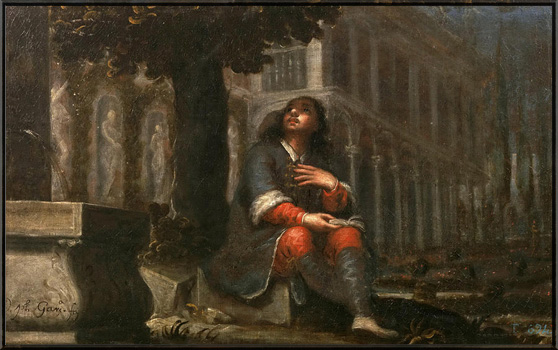
St Augustine at the Moment of his Religious Conversion
Delay of Conversion
by Fr. Francis Xavier Weninger, 1877
I am sure that scarcely a sinner exists in whose breast a lingering spark of faith still glimmers, who does not cherish the hope that, at some future time, he may return to his duty. Yes, although he may have given over his soul to the devil, he does not despair to return to God, though it be at his dying hour. Very good! There is a possibility, of course, that he may be converted by a miracle at the last; but what folly to wait for a miracle! O folly! folly! O blind and infatuated worldlings!
A preacher can scarcely ever select this subject for a discourse to his hearers without having before him some one to whom it applies.
My subject today, therefore, shall be the great danger in which the soul is placed, of eternal reprobation, by this lamentable delay in returning to God.
Mary, patroness of a happy death, pray that thy poor, erring children may obtain the grace of a true conversion, and return, without delay, to the service of thy Son! I speak in the most holy name of Jesus, for the greater honor and glory of God!
"Delay not to be converted to thy God; today when thou shalt hear His voice, do not harden thy heart." The Holy Ghost thus admonishes us; our own conscience whispers the same. Let us not still its voice; but walk according to the light of faith and the dictates of reason.
There are many, even among Catholics, who delay their conversion until the hand of the Lord is upon them, and they are stretched upon their dying bed. During life their object seemed to be to defraud their Creator of the love and obedience due Him; and now they would even defraud the devil of what they so assiduously prepared for him. Can aught but a miracle save such a creature? What can be said to one who thus delays his conversion?
Listen, sinner! your cry is: "Tomorrow! tomorrow! yet, for a little while, I will drive the thought of God away! "By this you acknowledge that you intend to change your life at some future time; then, too, you admit that at present you are leading an evil life. A sick person tries to obtain relief without delay. Christian! sinner! is corporal illness to be mentioned in the same breath with that dreadful malady which oppresses your soul? There is but one evil, but it is the origin and source of all evils, and that is: Sin! You believe this, and yet your cry is: "Tomorrow! tomorrow!" O folly! O presumption! You say: "Another time! Then, according to your own confession, sin is no gain. No, it is not. On the contrary, it is loss. And what a loss! It means the loss of God, of heaven, of all that is worth having, if you die in your present state.
Is there one among you who, losing a sum of money, would not immediately take steps to recover it? And what is money in comparison to divine grace? Christian! sinner! some other time, do you say? Would you say to the physician who comes to you in sickness: "I do not require your services now; come some other time; come in a month or a year?" Behold, you are sick unto death; and, according to St. Ambrose, your malady is either pride, avarice, anger, gluttony, envy or impurity. Christ is your Physician, the Sacrament of Penance your remedy; use it, and be healed.
"Some other time," you say. If a conflagration were raging in your vicinity, and waves of the fiery sea were rolling madly towards your home, would you say: "Tomorrow! tomorrow! it will be time enough then to extinguish the flames?"
"Some other time," you say. If you fell from a ship into the ocean; and if I, seeing you fall, hastened to your rescue, would you repulse my aid, and say: "Tomorrow! tomorrow! it will be time enough then?"
O sinner! your soul is engulfed in the restless waves of passion, and the priests of your Holy Church eagerly extend a helping hand, longing to aid you; but you say: "Some other time; I am not in danger yet!"
Now, I ask you one question: Will it always be in your power to return to God? You fain would answer : Yes! and believe you are in the right; but I must warn you that you may be most sadly mistaken. You are free; but do you consider the force of habit?
Holy Scripture assures us that the young man does not turn in old age from the path he pursued in youth. There are exceptions, it is true; but experience tells us that they are few. And when did our Lord assure you that His efficacious grace would be ready for you whenever it suited your convenience to accept it?
"I will have time enough, later on I will listen to the voice of God." You have no assurance that you will. Listen to this terrible warning: " You shall seek Me, but you shall not find Me; you shall die in your sins! As our sins have their measure, so also has the grace of God, which He alone knows. And are you willing to expose yourself to the frightful risk of losing your soul? Be wise, and today when you hear His voice, harden not your heart. Do not say: "God is merciful, and I can repent even on my death-bed." He is merciful, but He is just also; and how many are called before the judgment-seat of Christ without a moment's warning! This is especially the case; in America, where fatal accidents are of constant occurrence. And even were you certain of the very day and hour of your death, are you sure that you will have a priest to assist you? Do not say: "Yes, I am sure; I live so near the Church, I can not fail to have the priest." I tell you, that were the priest to take up his abode in your very house, you could have no such assurance. Many have allowed themselves to be deluded thus; and, death surprising them, they have gone to "the house of their eternity" without the support and aid of the Holy Sacraments, and, perhaps, alas, have been lost forever!
Be not presumptuous in postponing your conversion; for even if you should have a priest to assist you in your last moments, could you, after a life spent in forgetfulness of God and His commandments, so dispose your soul in a moment as to benefit by his assistance? You know not in what state you will be in that awful hour. Your mind may be weakened, and your body enfeebled and convulsed with pain, so as to prevent you from making your confession properly. And could you be absolved in that helpless condition?
I do not say that the priest would not pronounce the words of absolution, but would they be of any avail? You might be unable to elicit one single act of heartfelt contrition.
What is meant by true contrition? That sorrow which will enable you to detest sincerely all that you for years have loved and esteemed more than God, to whom you are indebted for every thing. Consider it well, O sinner! You have loved the world and its creatures during a life-time, clinging to them as long as you could; and now that you see them slipping away, you pretend to forsake them, and to turn lovingly to that God towards whom you have been more than indifferent. Ah, friends! nothing less than a miracle of grace is needed here! The priest may be deceived; but to God the heart of the dying impenitent sinner is fully revealed in all its deformity. Think of the terrible examples we read in Holy Scripture! The dying Antiochus was loud in his professions of repentance and of resolutions to lead a godly life, if God would spare him. "He prayed to the Lord, of whom he was not to obtain mercy," because he only prayed as does a slave writhing under the pain of the lash. In health, he would have gone on in his wickedness. Therefore, O sinner! listen to the warning you receive today, and delay not to be converted to the Lord thy God!
Would that, from all here present, who are in mortal sin, the priest, in the tribunal of penance, could receive the blessed assurance, that during this sermon, " at the same hour" that you listened to my words, you resolved, within your hearts: "I will delay no longer; I will make a good confession, and save my soul." To which the whole celestial host cry: Amen!
.

On the Number of Sins You Commit
by St. Alphonsus Di Liguori
"Because sentence is not speedily pronounced against the evil, the children of men commit evil without fear."--Eccl. viii. 11.
FIRST POINT.
It is the opinion of many holy fathers --of St. Basil, St. Jerome, St. Ambrose, St. Cyril of Alexandria, St. John Chrysostom, St. Augustine, and others--that as God (according to the words of Scripture, Wis. xi. 21--"Thou hast ordered all things in measure, and number, and weight") has fixed for each the number of his days, the degrees of health and talent which He will give to him, so He has also determined the number of sins which he will pardon; and when this number is completed, he will pardon no more. And these fathers have not spoken at random, but resting on the sacred Scriptures. In one place the Lord says that He restrained His vengeance against the Amorrhites, because the number of their sins was not as yet filled up-- "For as yet the iniquities of the Amorrhites are not at the full." --Gen. xv. 16. In another place He says, "I will not add any more to have mercy on the house of Israel." --Osee i. 6. Again he says, "All the men who have tempted me ten times . . . . shall not see the land."--Num. xiv. 22, 23. "Thou hast," says Job, "sealed up my offences as it were in a bag." --Job xiv. 17. Sinners keep no account of their sins; but God keeps an account of them, that when the harvest is ripe,--that is, when the number of sins is completed,--he may take vengeance on them. "Put ye in the sickles; for the harvest is ripe."--Joel iii. 13. In another place he says, "Be not without fear about sin forgiven, and add not sin to sin."--Eccl. v. 5. As if he said, O sinner! you must tremble even on account of the sins which I have forgiven you; for if you add another, it may happen that this new sin, along with those which have been pardoned, may complete the number, and then there shall be no more mercy for you. ''The Lord waiteth patiently, that, when the day of judgment shall come, he may punish them in the fulness of their sins."--2 Mach. vi. 14. God waits till the measure of iniquities is filled up, and then he chastises the sinner.
Of such chastisements there are many examples in the Scriptures. Saul disobeyed God a second time, and was abandoned. When he entreated Samuel to intercede for him, saying, "Bear, I beseech thee, my sin, and return with me that I may adore the Lord," (1 Kings xv. 25,) Samuel answered, "I will not return with thee, because thou hast rejected the word of the Lord, and the Lord hath rejected thee."--ver. 26. We have also the example of Balthassar, who, after having profaned the vessels of the temple at table, saw a hand writing on the wall, "Mane, Thecel, Phares." Daniel came, and in explaining these words, among other things, said, "Thou art weighed in the ballnce, and art found wanting."--Dan, v. 27. By these words he gave the king to understand that in the balance of divine justice the weight of his sins had made the scale descend. "The same night Balthassar, the Chaldean king, was killed." O, how many miserable sinners meet with a similar fate! They live many years multiplying sins ; but, when the number is filled up, they are struck dead, and cast into hell. "They spend their days in wealth, and in a moment they go down to hell."--Job xxi. 13. There are some who spend their time in investigating the number of the stars, the number of the angels, or the number of years which each shall live. But who can discover the number of sins which God will pardon each individual? We should, therefore, tremble. My brother, it may be that God will pardon you no more after the first criminal pleasure which you indulge, after the first thought to which you consent, or after the first sin which you commit.
The obstinate sinner may say, But I have so often offended God, and He has pardoned me; I also hope He will pardon me the sin which I intend to commit. But, I ask, must God spare you forever, because He has not hitherto chastised you? The measure shall be filled up, and vengeance shall come. Samson continued to allow himself to be deluded by Dalila, hoping that, as on former occasions, he would escape from the Philistines. "I will go out, as I did before, and shake myself"--Judges xvi. 20. But at last he was taken, and lost his life. "Say not, I have sinned, and what harm hath befallen me? "--Eccl. v. 4. Say not, says the Lord, I have committed so many sins, and God has not chastised me; "for the Most High is a patient rewarder; " (Ibid. ;)--that is, He will one day come and punish all; and the greater the mercy which He will have shown, the more severe shall be the chastisement which He will inflict. St. Chrysostom says, that God should be dreaded more when He bears with the obstinate sinner, than when He punishes him suddenly. Because, according to St Gregory, if they remain ungrateful, God punishes with the greatest rigor those whom He waits for with the greatest patience. And it often happens, adds the saint, that they whom God has borne with for a long time, die unexpectedly, and without time for repentance. And the greater the light which God will have given, the greater shall be your blindness and obstinacy in sin. "For it had been better for them not to have known the way of justice, than, after they have known it, to turn back.''--2 Pet. ii. 21. And St. Paul says, that it is morally impossible for a soul that sins after being enlightened, to be again converted. "For it is impossible for those who were once enlightened, have tasted the heavenly gifts, . . . . and are fallen away, to be renewed to penance."--Heb. vi. 4, 6.
The threats of the Lord against those who are deaf to His calls, are truly alarming. "Because I have called, and you have refused, . . . . I also will laugh in your destruction, and will mock when that shall come to you which you feared."--Prov. i. 24. Mark the words--I also: they mean that, as the sinner has mocked God by his confessions, by promising fidelity, and afterwards betraying him, so the Lord will mock him at the hour of death. The wise man says, "As a dog that returned to the vomit, so is the fool that repeateth his folly."--Prov. xxvi. 11. In explaining this text, Denis the Carthusian says, that as a dog that eats what he has just vomited, is an object of disgust and abomination, so the sinner who relapses into sins which he has detested in the tribunal of penance, renders himself hateful in the sight of God.
O God! If you purchase a house, you spare no pains to get all the securities necessary to guard against the loss of your money; if you take medicine, you are careful to assure yourself that it cannot injure you; if you pass over a torrent, you cautiously avoid all danger of falling into it; and for a miserable gratification, for a beastly pleasure, you will risk your eternal salvation, saying, "I expect to go to confession after this sin." But when, I ask, will you go to confession? "Perhaps on Sunday." And who has promised that you will live till Sunday? Perhaps you intend to go to confession to-morrow. But who promises you to-morrow. How can you promise yourself that you shall go to confession to-morrow, when you know not whether you shall be among the living in another hour? "He," continues the saint (St. Augustine), "who has promised pardon to penitents, has not promised to-morrow to sinners; perhaps He will give it, and perhaps He will not." If you now commit sin, God, perhaps, will give you time for repentance, and perhaps He will not; and should He not give it, what shall become of you for all eternity? In the mean time, by consenting to sin, you lose your soul for the sake of a miserable pleasure, and expose yourself to the risk of being lost forever. Would you, for that vile gratification, risk a sum of one thousand ducats? Would you, for that momentary pleasure, expose to danger your all--your money, your houses, your possessions, your liberty and life? Surely you would not. Will you, then, for that wretched delight, lose all--your soul, heaven, and God? Do you believe that heaven, hell, and eternity, are truths of faith, or that they are fables? Do you believe that, if death overtake you in sin, you shall be lost forever? O, what temerity! what folly! to condemn yourself, by your own free act, to an eternity of torments, with the hope of afterwards reversing the sentence of your condemnation. No one is as foolish as to take poison with the hope of being preserved from death; and will you condemn yourself to eternal death, saying, I will, perhaps, be hereafter delivered from it? O folly which has brought, and brings, so many souls to hell! "Thou hast," says the Lord, "trusted in thy wickedness . . . Evil shall come upon thee, and thou shalt not know the rising thereof."--Isa. xlvii. 10, 11. You have sinned through a rash confidence in the divine mercy; vengeance shall unexpectedly fall upon you, and you shall not know whence it comes.


